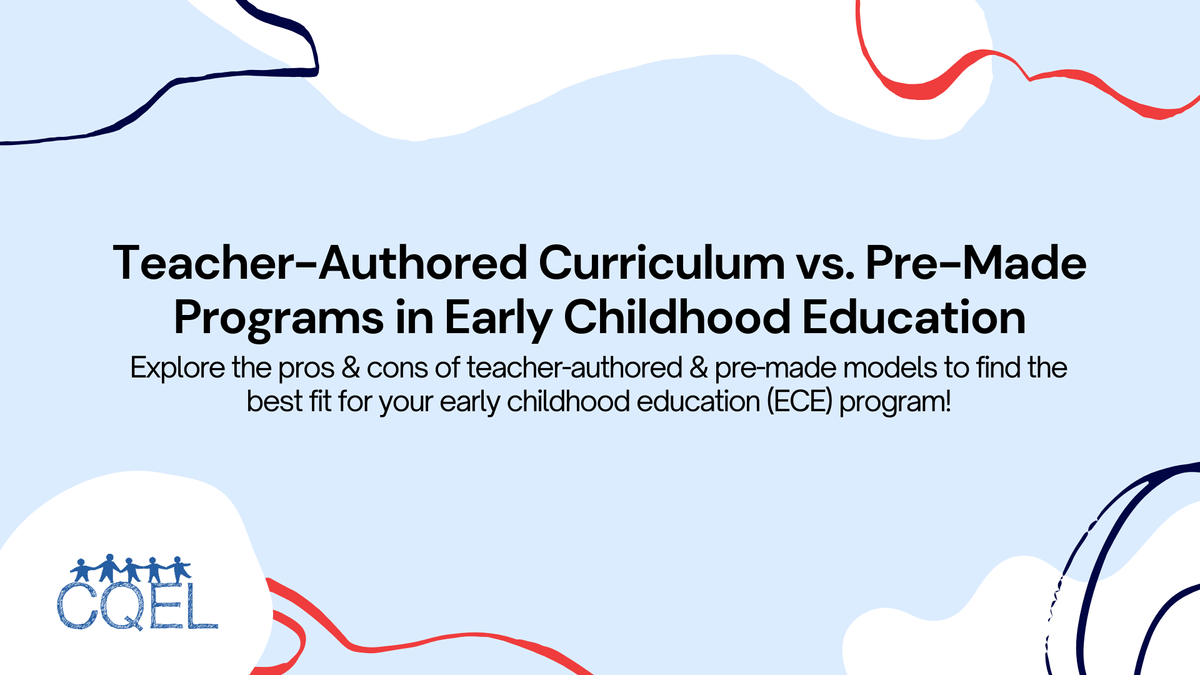Teacher-Authored Curriculum vs. Pre-Made Programs in Early Childhood Education
Explore the pros & cons of teacher-authored & pre-made models to find the best fit for your early childhood education (ECE) program!

As an aspiring childcare provider in California, crafting a curriculum for your program is a crucial step. While pre-made curriculum options abound, the question arises: Should you entrust this responsibility solely to a teacher or explore alternative approaches? Let's delve into the pros and cons of teacher-authored and pre-made curriculum models to help you make an informed decision for your early childhood education (ECE) program.
Teacher-authored curriculums offer a unique advantage – customization. Teachers who craft their own curriculum can tailor it to the specific needs and interests of the children in their classroom. Imagine a group of children fascinated by insects; a teacher-designed curriculum could incorporate butterfly lifecycle explorations, nature walks to observe crawling creatures, and creative art projects depicting favorite bugs. This level of personalization fosters deeper engagement and allows teachers to capitalize on children's natural curiosity. Furthermore, teacher-authored curriculums offer flexibility. Teachers can adjust activities on the fly based on children's responses or emerging interests. This adaptability ensures learning experiences remain dynamic and cater to the ever-evolving needs of the classroom.
However, teacher-authored curriculums also present challenges. Time constraints are a major hurdle for busy childcare providers. Developing a comprehensive curriculum from scratch requires significant time and effort. Additionally, ensuring alignment with California's Early Learning and Development Standards (ELDS) can be a complex task. Teachers might lack the expertise to create activities that effectively address all developmental domains outlined in the ELDS. Finally, consistency across classrooms within a program might be compromised with teacher-authored curriculums, leading to potential disparities in learning experiences for different groups of children.
Pre-made curriculums offer a solution to some of these challenges. These commercially available programs often come with detailed lesson plans, activity guides, and readily available materials. This saves teachers valuable time and ensures consistency across classrooms within a program. Many pre-made curriculums are also specifically designed to align with the ELDS, offering peace of mind for childcare providers. Furthermore, some programs provide ongoing support and professional development opportunities for teachers, ensuring they feel comfortable implementing the curriculum effectively.
However, pre-made curriculums also have limitations. One major drawback is the lack of customization. Activities might not resonate with the unique interests of a particular group of children, potentially leading to disengagement. Additionally, pre-made curriculums might not offer the same level of flexibility as teacher-authored programs. Teachers might find themselves constrained by the pre-determined structure and unable to adapt activities to meet the specific needs of their students.
Ultimately, the ideal curriculum for your childcare program might lie somewhere in between. Consider adopting a pre-made curriculum as a foundation, then customizing it to incorporate the interests and needs of the children in your care. This hybrid approach allows you to leverage the benefits of both models – the structure and time-savings of a pre-made program alongside the flexibility and personalization offered by a teacher-authored curriculum. Remember, the most effective curriculum is one that fosters a stimulating and engaging learning environment for all children entrusted to your care.
